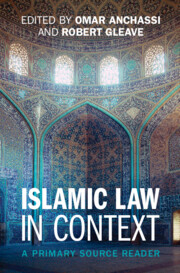Book contents
- Islamic Law in Context
- Islamic Law in Context
- Copyright page
- Contents
- Acknowledgements
- Contributors
- Introduction
- Part I Islamic Legal Theory (Uṣūl al-Fiqh) and Related Genres
- Part II Islamic Jurisprudence (Fiqh) and Related Genres
- Part III Legal Opinions (Fatwās)
- Part IV Court Judgments and Other Court Documentation
- Chapter 24 Introduction to Part IV
- Chapter 25 The Restitution of Conjugal Rights
- Chapter 26 A Sharīʿa Court Judgment of Muḥammad Ḥusayn Fishārakī (d. 1353/1935) Reviving the Safavid Waqf of Mīrzā Aḥmad Kafrānī (d. after 988/1580)
- Chapter 27 Authenticating Marriage
- Chapter 28 Judgment of the Moroccan Supreme Council of Sharīʿa Appeals, Ruling No. 52 on Issue No. 4164 concerning Inheritance, Slavery and Paternity (1359/1943)
- Chapter 29 Sharīʿa, Sales and Loans in the Malaysian High Court
- Chapter 30 A Sharīʿa Court Decision on the Type of ‘Compensation’ in Huləʾə/Khulʿ Divorce
- Part V Judicial Manuals and Reference Books
- Part VI Alternative Sources for Islamic Legal Studies
- Name Index
- Subject Index
- References
Chapter 25 - The Restitution of Conjugal Rights
A Court Judgment in British India by Syed Mahmood (d. 1321/1903)
from Part IV - Court Judgments and Other Court Documentation
Published online by Cambridge University Press: 14 November 2024
- Islamic Law in Context
- Islamic Law in Context
- Copyright page
- Contents
- Acknowledgements
- Contributors
- Introduction
- Part I Islamic Legal Theory (Uṣūl al-Fiqh) and Related Genres
- Part II Islamic Jurisprudence (Fiqh) and Related Genres
- Part III Legal Opinions (Fatwās)
- Part IV Court Judgments and Other Court Documentation
- Chapter 24 Introduction to Part IV
- Chapter 25 The Restitution of Conjugal Rights
- Chapter 26 A Sharīʿa Court Judgment of Muḥammad Ḥusayn Fishārakī (d. 1353/1935) Reviving the Safavid Waqf of Mīrzā Aḥmad Kafrānī (d. after 988/1580)
- Chapter 27 Authenticating Marriage
- Chapter 28 Judgment of the Moroccan Supreme Council of Sharīʿa Appeals, Ruling No. 52 on Issue No. 4164 concerning Inheritance, Slavery and Paternity (1359/1943)
- Chapter 29 Sharīʿa, Sales and Loans in the Malaysian High Court
- Chapter 30 A Sharīʿa Court Decision on the Type of ‘Compensation’ in Huləʾə/Khulʿ Divorce
- Part V Judicial Manuals and Reference Books
- Part VI Alternative Sources for Islamic Legal Studies
- Name Index
- Subject Index
- References
Summary
This chapter explores an 1886 judicial decision by Justice Syed Mahmood (d. 1321/1903)—the son of the famous Indian Muslim reformist and educator Sir Syed Ahmed Khan—on a case involving the restitution of conjugal rights, namely, the ability of a husband to sue his wife in court for unlawfully abandoning the martial home. This decision is important for the ways it reflects the operation of Islamic law in a context of British domination, in which premodern Islamic legal norms are read through the lense of the British Common Law tradition, and in which the apparatus and ecosystem of Islamic law have been transformed almost beyond recognition by the emergence of the modern state.
- Type
- Chapter
- Information
- Islamic Law in ContextA Primary Source Reader, pp. 266 - 278Publisher: Cambridge University PressPrint publication year: 2024

